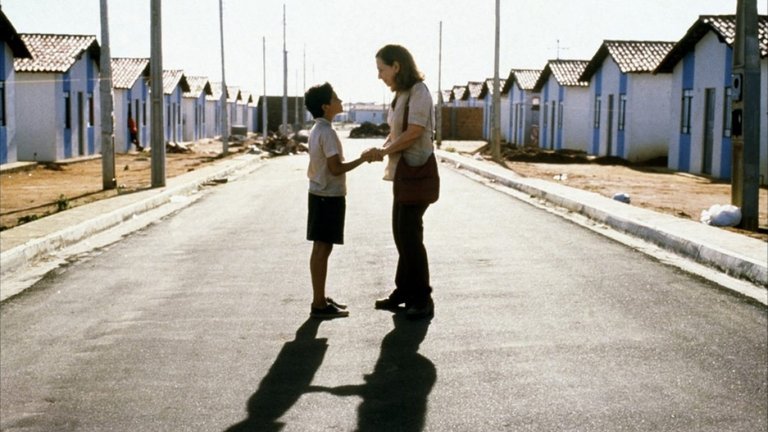Film Review: Central Station (Central do Brasil, 1998)

At the end of last century, Brazil was still far from First World standards. Large percentage of household didn’t have many things people in developed countries take for granted, like running water or sewage. And, under such conditions, it was to be expected that many Brazilians would not only live in poverty and squalor, but also lack the most basic education or even literacy. That sad state of affairs was, however, viewed as an opportunity by the protagonist of Central Station, 1998 Brazilian drama directed by Walter Salles.
The plot begins in Rio De Janeiro where Isadora “Dora” Teixeira (played by Fernanda Montenegro), a retired teacher, supplements her income by writing letters for illiterate people who congregate at Rio De Janeiro Central Station. Dora is hardened and cynical woman who often doesn’t even bother to mail the letters and instead destroys them or, when she is particularly mean-spirited, reads them to her friend Irene (played by Marília Pêra). Dora's life changes, however, when Ana (played by Soia Lira), one of her illiterate clients, dies and her 10-year-old son Josué (de Oliveira), who doesn't know anyone in Rio, starts pestering her for help. Due to a twist of fate, Dora gets tangled with the local criminals and is forced to flee Rio, taking the opportunity to help little Josue find his father. Their journey leads them to the remote, arid and impoverished northeast part of Brazil, where they will experience all sorts of adventures.
When Central Station appeared in Croatia, local audience have already been accustomed to Brazilian telenovelas, but Brazilian feature films were rarity. Salles’ film received regular distribution mainly thanks to winning Golden Globe for Best Foreign Film and other prestigious festival awards. Those who watched it and disregarded previous bias against non-Hollywood films were ultimately awarded by very good piece of cinema. The most interesting thing about Central Station it is a road film, which allowed Salles to shatter some of the cliches and stereotypes about Brazil, usually related to Rio De Janeiro, sandy beaches and exotic music. The protagonists’ journey allowed Salles to depict Brazil as vast country, revealing a nuanced tapestry of regional diversity, cultural richness, and religious complexities. Central Station puts sharp contrast between Rio's urban sprawl and the Northeast with its arid landscape and small, dusty towns in state of economic hardship, with religion often serving as the only solace to the inhabitants. The religion is, like the rest of Brazil, diverse, and the film depicts both traditional Catholicism embodied in rural shrines and growing force of evangelic Christianity, depicted through Pentecostal ceremonies and character of kind-hearted but devout truck driver.
The basic concept behind Central Station, on the other hand, isn't particularly original and many viewers will be reminded not only of numerous Hollywood films in which hardened protagonist softens up after spending time in company of adorable child, but also of non-Hollywood Oscar-winning films like Kolya who used exactly the same formula. What elevates the film far above the cliches is excellent cast. Fernanda Montenegro, a veteran actress who was 69 at the time of production, shines together with 10-year old Vinicius de Oliveira, child actor whom Salles originally met at the airport where he had worked as shoeshine boy. what is even memorable is the uncompromising, naturalistic approach to Brazilian reality, whether it's the harsh life of poverty or the flaws of the main character. At the beginning Dora embodies all the chracteristics of a villain, but thanks to Fernanda Montenegro's talent, her moral transformation into some sort of hero is gradual and almost imperceptible. Salles also shows, without any hesitation, the poverty and moral decay of Brazilian society, where the life of a poor man is not worth a penny. On the other hand, in the second part the film the social dimension gives way to sentimental cliches of the road film, and Salles offers the religious virtues of the Brazilian countryside as a cure for the moral corruption of Brazilian cities. While liberal and progressive viewers might see this as a flaw, the bigger and more universal problem of the film is irritating music. Despite that, Central Station is a film that leaves a strong impression on the viewers and represent something Brazilian cinema should be proud of.
RATING: 7/10 (+++)
Blog in Croatian https://draxblog.com
Blog in English https://draxreview.wordpress.com/
InLeo blog https://inleo.io/@drax.leo
InLeo: https://inleo.io/signup?referral=drax.leo
Unstoppable Domains: https://unstoppabledomains.com/?ref=3fc23fRc42c1b417
Hiveonboard: https://hiveonboard.com?ref=drax y
Bitcoin Lightning HIVE donations: https://v4v.app/v1/lnurlp/qrcode/drax
Rising Star game: https://www.risingstargame.com?referrer=drax
1Inch: https://1inch.exchange/#/r/0x83823d8CCB74F828148258BB4457642124b1328e
BTC donations: 1EWxiMiP6iiG9rger3NuUSd6HByaxQWafG
ETH donations: 0xB305F144323b99e6f8b1d66f5D7DE78B498C32A7

look at what a wicked woman... I like Brazilian films, and if it's an award winner, I think it's a good idea to watch. Thanks for sharing it.